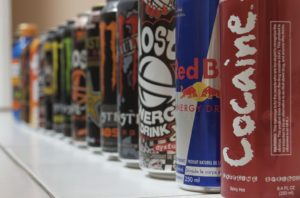 Whether you’re an athlete, office worker or adolescent teen, the energy drink has, over the last decade, become the new coffee – just sweeter and more interesting that a flat white. And while the government continues its mission (in between Brexit discussions) to change the law to ban their sale (especially for children), the energy drink market continues to evolve exponentially.
Whether you’re an athlete, office worker or adolescent teen, the energy drink has, over the last decade, become the new coffee – just sweeter and more interesting that a flat white. And while the government continues its mission (in between Brexit discussions) to change the law to ban their sale (especially for children), the energy drink market continues to evolve exponentially.
The days when Red Bull was the only energy drink on the market are long gone and we now face a myriad of choices. Yet the shine has long since been rubbing off these drinks as we, an increasingly health-conscious society, sit up and question the impacts these drinks have on our bodies. Like social media (a bit of light fun to start with), dark clouds now loom over them. And with that in mind, here are the top five reasons why energy drinks should be handled with caution…
1. Excess caffeine and cardiovascular health
Marketing is a very special thing – which is why essentially putting coffee in a can with a monster claw on it (you know which one I mean) it all of a sudden becomes more attractive. Caffeine is the building block of almost every single energy drink. In a 250ml can of leading energy drink you can expect to find anywhere from 80 to 300 milligrams of caffeine – the former equating to about a cup of instant coffee. Drink three or four cans a day (and, people really do) and you will soon be exceeding the recommended daily intake. The risk is that this can lead to heart palpitations, irregular health rhythms, a rise in your blood pressure (all of which can increase your risk of a cardiovascular disease) and unpleasant sensations of excessive sweating and nausea.
2. Dehydration and kidney stone development
This is an emerging issue that still, in all honesty, has a question mark over it. Essentially the development of kidney stones can, in part, be caused by dehydration – especially uric acid stones. Other factors include high protein diets and being genetically pre-disposed. Caffeine naturally acts as a diuretic (it makes you urinate) and is why everyone tells you to reduce your caffeine intake at night if you don’t want your bladder to wake you up. Energy drinks are dripping in caffeine, so if you were to drink enough you could dehydrate yourself and increase the risk of kidney stone development. Interestingly, athletes will be at even higher risk as they will also be having a higher protein diet alongside this.
This one is very straightforward. Energy drinks contain huge amounts of sugar (usually easily half of your daily recommended allowance) and unnecessary calories. And despite many trying to clean up their act (Red Bull’s sugar-free drink, for example), this still largely remains the case. With the non-athletic use of energy drinks high, the calorie input vastly outstrips the energy demand and so these calories then easily get converted to, and stored, as fat. And we all know that fat is bad and will contribute to the development of obesity. However, what’s worse than fat? Sugar. You see, the sugar content means that your blood stream is flooded and your body’s sugar regulation has to fight to control it. With sustained use, it will eventually lose the fight and insulin resistance develops (the hormone used to regulate sugar) with diabetes mellitus becoming a real risk. Plus, when you mix these drinks with alcohol the calorie intake sky-rockets and these problems only get bigger.
4. High-energy drinks and bowel cancer
A little like the issue with the high sugar content and diabetes risk, there is a demonstrated link with bowel cancer and poor diet. Energy drinks definitely do not fall into the healthy diet category, sadly. It is, however, important to take a step back and appreciate that it’s not the energy drink per se that is increasing the risk of cancer – but the high-calorie and sugar content that increases the risk.
5. Excessive dependence and mental health
Numerous studies now suggest that our mental health can be affected by energy drinks. It’s not entirely clear why but an increase in stress, anxiety and depression has been linked to them. This is very likely to be strongly multifactorial.
Final message: moderation if you really want them
In a time when we are increasingly seeking natural, holistic health and wellbeing, energy drinks that are dense in sugar and caffeine are not even close. However, like everything in health, it is all about moderation. Drinking an energy drink every now and then is, in reality, unlikely to cause any long-term damage. It is instead when their use becomes daily – and, especially multiple – and a habitual crux to your day. If this happens, it’s time to look to reduce your intake and as ever, if you need, head along to see your GP for some more support and information.
–
Credit: Dr Nick Knight is a GP based in London, GQ-Magazine



